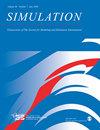Particle filter–based data assimilation in dynamic data-driven simulation: sensitivity analysis of three critical experimental conditions
IF 2
4区 工程技术
Q4 COMPUTER SCIENCE, INTERDISCIPLINARY APPLICATIONS
Simulation-Transactions of the Society for Modeling and Simulation International
Pub Date : 2022-12-26
DOI:10.1177/00375497221143988
引用次数: 0
Abstract
Data assimilation (DA) is a methodology widely used by different disciplines of science and engineering. It is typically applied to continuous systems with numerical models. The application of DA to discrete-event and discrete-time systems including agent-based models is relatively new. Because of its non-linearity and non-Gaussianity, the particle filter (PF) method is often a good option for stochastic simulation models of discrete systems. The probability distributions of model runs, however, make it computationally intensive. The experimental conditions therein are understudied. This paper studied three critical conditions of PF-based DA in a discrete event model: (1) the time interval between two consecutive DA iterations, (2) the number of particles, and (3) the actual level and perceived level of measurement errors (or noises). The study conducted identical-twin experiments of an M/M/1 single server queuing system. The ground truth is imitated in a stand-alone simulation model. The measurement errors are superimposed so that the effect of the three conditions can be quantitatively evaluated in a controlled manner. The results show that the estimation accuracy of such a system using PF is more constrained by the choice of time intervals than the number of particles. An under estimation of measurement errors produces worse state estimates than an over estimation of errors. A correct perception of the measurement errors does not guarantee better state estimates. Moreover, a slight over estimation of errors results in better state estimates, and it is more responsive to abrupt system changes than an accurate perception of measurement errors.动态数据驱动仿真中基于粒子滤波的数据同化:三个关键实验条件的敏感性分析
数据同化(Data assimilation, DA)是一种广泛应用于不同科学和工程学科的方法。它通常应用于具有数值模型的连续系统。数据分析在离散事件和离散时间系统(包括基于智能体的模型)中的应用相对较新。粒子滤波(PF)方法由于其非线性和非高斯性,通常是离散系统随机仿真模型的一个很好的选择。然而,模型运行的概率分布使其计算量很大。其中的实验条件还有待进一步研究。本文研究了离散事件模型下基于pf的数据处理的三个关键条件:(1)连续两次数据处理迭代之间的时间间隔,(2)粒子数量,(3)测量误差(或噪声)的实际水平和感知水平。本研究对M/M/1单服务器排队系统进行了同卵双胞胎实验。在一个独立的仿真模型中模拟真实情况。测量误差叠加在一起,从而可以以可控的方式定量地评价这三种条件的影响。结果表明,时间间隔的选择比粒子个数的选择更能约束系统的估计精度。对测量误差的估计不足比对误差的估计过高产生更差的状态估计。对测量误差的正确感知并不能保证更好的状态估计。此外,对误差的轻微过度估计会导致更好的状态估计,并且它比对测量误差的准确感知更能响应系统的突然变化。
本文章由计算机程序翻译,如有差异,请以英文原文为准。
求助全文
约1分钟内获得全文
求助全文
来源期刊
CiteScore
3.50
自引率
31.20%
发文量
60
审稿时长
3 months
期刊介绍:
SIMULATION is a peer-reviewed journal, which covers subjects including the modelling and simulation of: computer networking and communications, high performance computers, real-time systems, mobile and intelligent agents, simulation software, and language design, system engineering and design, aerospace, traffic systems, microelectronics, robotics, mechatronics, and air traffic and chemistry, physics, biology, medicine, biomedicine, sociology, and cognition.

 求助内容:
求助内容: 应助结果提醒方式:
应助结果提醒方式:


